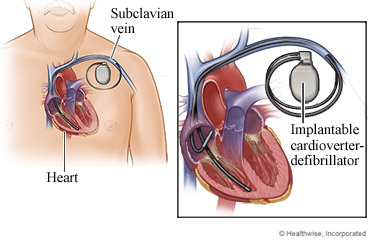
What is an ICD?
An ICD (implantable cardioverter-defibrillator) is a small, battery-powered device. It fixes serious changes in your heartbeat. ICDs are used in people who've had a life-threatening heart rhythm or are at high risk of having one.
The ICD is placed under the skin of the chest. It's attached to one or two wires (called leads). These leads go into the heart through a vein (transvenous).
How does it work?
An ICD is always checking your heart rate and rhythm. If the ICD detects a life-threatening, rapid heart rhythm, it tries to slow the rhythm back to normal using electrical pulses. If the bad rhythm doesn't stop, the ICD sends an electric shock to the heart. This restores a normal rhythm. The device then goes back to its watchful mode.
Some ICDs can also fix a heart rate that is too slow. The ICD does this without using a shock. It has wires that go inside the heart. It can use these wires to send out electrical pulses to speed up a heart rate that's too slow.
Your doctor will check the ICD regularly to make sure that it's working right and isn't causing any problems. Your doctor will also check the battery.
How is it placed?
Your doctor will put the ICD under the skin in your chest during minor surgery. You will likely have medicine to make you feel relaxed and sleepy during the surgery.
Your doctor makes a small cut (incision) in your upper chest. The doctor puts one or two leads (wires) through the cut. The leads go into a large blood vessel in the upper chest. Then your doctor guides the leads through the blood vessel into your heart. Your doctor connects the leads to the ICD and places it in your chest. Then the incision is closed. Your doctor also programs the ICD.
Most people spend the night in the hospital, just to make sure that the device is working and that there are no problems from the surgery.
How does it feel to get a shock?
The shock from an ICD hurts briefly. People feel it in different ways. It's been described as feeling like a punch in the chest. But the shock is a sign that the ICD is doing its job. It's there to save your life. You won't feel any pain if the ICD uses electrical pulses to fix a heart rate that is too fast or too slow.
There's no way to know how often a shock might occur. It might never happen.
Not knowing when or if a shock might happen may make you nervous. Knowing what to do if you get shocked can help. Ask your doctor for an action plan. This plan will guide you step-by-step if a shock happens.
How can you live well with an ICD?
You can live a normal life with your ICD. Here are a few tips for living well with your ICD.
- Use certain electric devices with caution. Some electric devices have a strong electromagnetic field. This field can keep your ICD from working right for a short time. Check with your doctor about what you need to avoid and what you need to keep a short distance away from your ICD. Many household and office electronics don't affect your ICD.
- Be sure that your health professionals know that you have an ICD. This includes any doctor, dentist, or other health professional you see.
- Always carry a card that tells what kind of device you have.
- Wear medical alert jewelry that says you have an ICD. You can buy this at most drugstores.
- If you get a shock, follow your action plan for what to do.
- Ask your doctor what sort of activity and intensity is safe for you. You can lead an active life with an ICD.
As you plan for your future and the end of life, be sure to include plans for your ICD. You can make the decision to turn off your ICD as part of the medical treatment you want at the end of life.
Follow-up care is a key part of your treatment and safety. Be sure to make and go to all appointments, and call your doctor if you are having problems. It's also a good idea to know your test results and keep a list of the medicines you take.
Where can you learn more?
Go to http://www.healthwise.net/patientEd
Enter F189 in the search box to learn more about "Learning About an ICD (Implantable Cardioverter-Defibrillator)".
Current as of: October 2, 2025
Author: Ignite Healthwise, LLC Staff
Clinical Review Board
All Ignite Healthwise, LLC education is reviewed by a team that includes physicians, nurses, advanced practitioners, registered dieticians, and other healthcare professionals.

